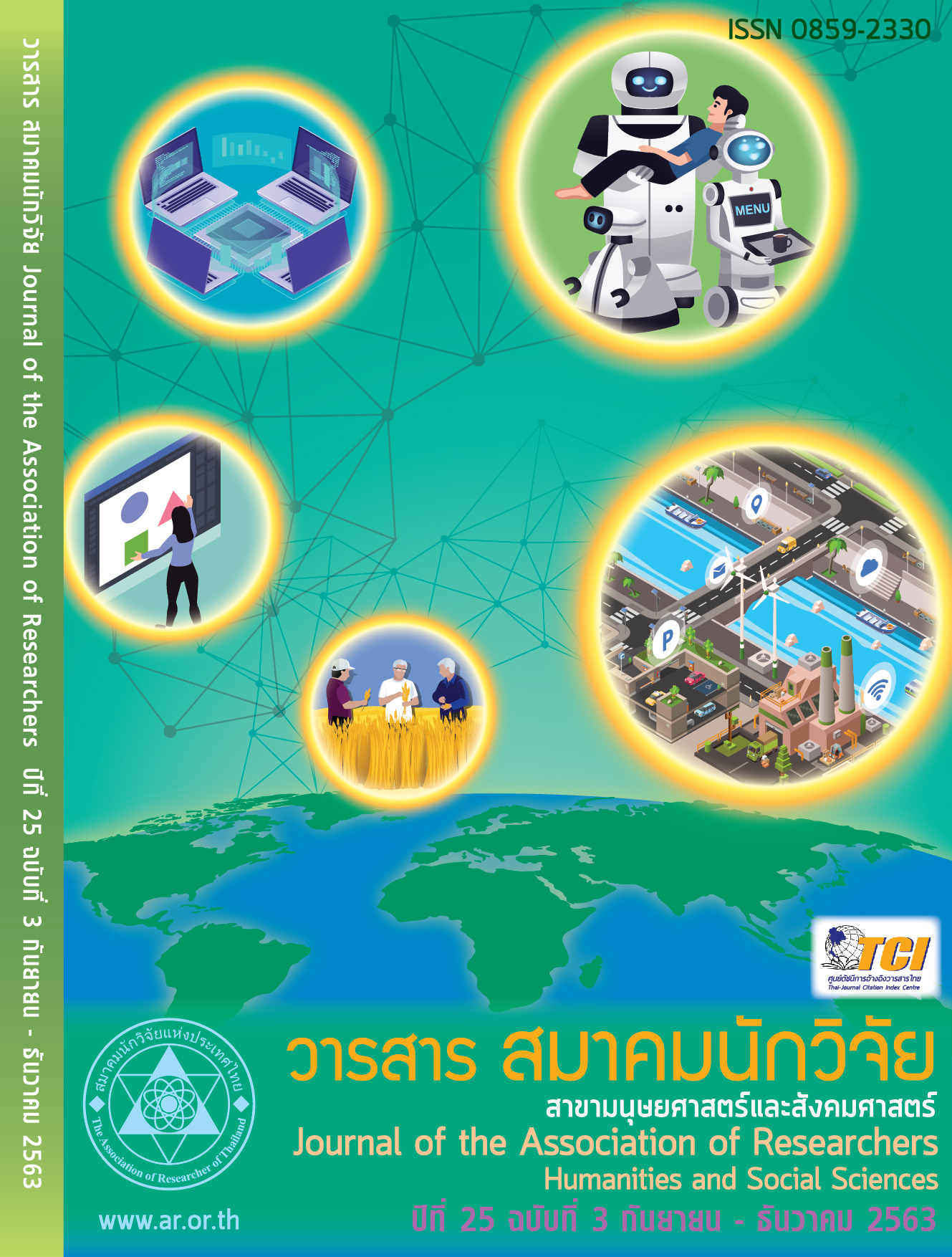National Competitiveness and Sustainable Development: Cases of Human Resources Development in Singapore and Thailand
Main Article Content
Abstract
National competitiveness is a significant issue of concern to scholars around the globe because it is one of the key factors that indicate the progress of the country along with the targets of sustainable development. Because of the globalization and dynamics and advancement of technology and innovation, the world is moving towards the digital economy and its transition to the fourth industrial revolution which will play a vital role in building up the competitiveness of the nations. The objectives of this article are aiming at reviewing the literature on the knowledge and components of competitiveness and identifying the linkage or relationship between the level of competitiveness of the country and the sustainable development management approach. The government’s policies and strategies were usually based on the development of competitiveness that enhances the level of national competitiveness; therefore, this study focused on a comparative study on the national human resource management strategies of Singapore and Thailand. This covered the visions and policies of both countries for the development of human resources in their respective countries in order to achieve a competitive advantage on the global platform. The study also included analyzing strategies and trends in the human resource development of Singapore and Thailand that had been used in the development of the country to enhance the capabilities of the citizen within the country to achieve sustainable advantage. The benefits of this study included the raise awareness of the use of the available resources for maximum benefit and efficiency. Along with the country's sustainable growth and the well-being of the people, the government and related agencies can also serve as a basis for ranking priorities and formulating or adjusting their policies and strategies to align with the country’s aims. It also can be used as a framework for setting a position in formulating international policies or strategies for the best benefits of the country.
Article Details
บทความที่ปรากฏในวารสารนี้ เป็นความรับผิดชอบของผู้เขียน ซึ่งสมาคมนักวิจัยไม่จำเป็นต้องเห็นด้วยเสมอไป การนำเสนอผลงานวิจัยและบทความในวารสารนี้ไปเผยแพร่สามารถกระทำได้ โดยระบุแหล่งอ้างอิงจาก "วารสารสมาคมนักวิจัย"
References
กรมส่งเสริมอุตสาหกรรม. (2563). SMEs Grow-up. สืบค้นจาก https://www.smesgrowup.com.
โพสต์ทูเดย์. (2562). สิงคโปร์ สร้างชาติด้วยคุณภาพการศึกษา สร้างการพัฒนาด้วยคุณภาพของคน. วันที่ 17 พฤศจิกายน 2562. สืบค้นจาก https://www.posttoday.com/world/606624
มูลนิธิมั่นพัฒนา. (2561). วิถีพอเพียงอย่างอย่างยั่งยืน. เดือนมิถุนายน 2561 สืบค้นจาก http://tsdf.nida.ac.th/th
ศักดิ์ดา ศิริภัทรโสภณ. (2556). การจัดการธุรกิจระหว่างประเทศ. (พิมพ์ครั้งที่ 3). กรุงเทพฯ: สำนักพิมพ์ เพียร์สัน เอ็ดดูเคชั่น อินโดไชน่า.
ศักดิ์ดา ศิริภัทรโสภณ. (2560). ความรับผิดชอบต่อสังคมกับการเพิ่มศักยภาพในการแข่งขันของไทยในประชาคมอาเซียน. วารสารสมาคมนักวิจัย, 22(3): 218-233.
ศักดิ์ดา ศิริภัทรโสภณ. (2563). โรคระบาดไวรัสโคโรนาสายพันธุ์ใหม่: ผลกระทบต่อวิสาหกิจขนาดกลางและขนาดย่อมของไทยและกลยุทธ์ในการฟื้นฟูกิจการ. วารสารสมาคมนักวิจัย, 25(2): 10-30.
สำนักงานสภาพัฒนาการเศรษฐกิจและสังคมแห่งชาติ. (2560). ยุทธศาสตร์ชาติ 20 ปี. สืบค้นจาก http://nscr.nesdb.go.th/ยุทธศาสตร์ชาติ
สำนักงานสภาพัฒนาการเศรษฐกิจและสังคมแห่งชาติ. (2563). คู่มือตัวชี้วัดความสามารถในการแข่งขันของ IMD และ IMF. สืบค้นจาก https://www.nesdc.go.th/article_attach/ article_file_20200103162946.pdf
องค์การสหประชาชาติ ประเทศไทย. (2563). เป้าหมายการพัฒนาอย่างยั่งยืน. สืบค้นจาก https://www.un.or.th/globalgoals/th/the-goals /
Andreoni, Valeria and Miola, Apollonia. (2016). Competitiveness and Sustainable Development Goals. JRC Technical Report, European Union. Retrieved from https://publications.jrc.ec.europa.eu/ repository/bitstream/JRC103576/lb-na-28316-en-n.pdf
Biophilic Singapore. (2020). History of Sustainability in Singapore. Retrieved from https://supsg.wordpress.com/2016/09/05/history-of-sustainability-in-singapore/
Corrigan, G., Crotti, R., Drzeniek, M., Serin, C. (2014). Assessing Progress Towards Sustainable Competitiveness. The Global Competitiveness Report, Chapter 1.2. World Economic Forum. Available online at: http://www3.weforum.org/docs/GCR2014-15/GCR_Chapter1.2_2014-15.pdf
Institute of Policy Studies. (2017). Year 2026: Doing Singapore Differently. Action Plan Singapore: An IPS Scenario-Planning Project, Lee Kuan Yew School of Public Policy, National University of Singapore. Retrieved from https://lkyspp.nus.edu.sg/docs/default-source/ips/full-report_action-plan-singapore_160217.pdf
International Institution of Management Development. (2019). Methodology and Principles of Analysis: IMD World Competitiveness Yearbook. Retrieved from https://www.imd.org/ globalassets/wcc/docs/methodology_world_competitiveness_center.pdf
International Institution of Management Development. (2020). IMD World Competitiveness Ranking 2020. Retrieved from https://www.imd.org/news/updates/IMD-2020-World-Competitiveness-Ranking-revealed/
McKinsey Global Institute. (2017). Artificial Intelligence and Southeast Asia’s Future. Discussion paper for Singapore summit 2017. Retrieved from https://www.mckinsey.com/~/media/McKinsey/ Featured%20Insights/Artificial%20Intelligence/AI%20and%20SE%20ASIA%20future/Artificial-intelligence-and-Southeast-Asias-future.ashx
Ministry of Foreign Affairs, Kingdom of Thailand. (2017). Sufficiency Economy Philosophy: Thailand’s Path towards Sustainable Development Goals. Retrieved from https://data.opendevelopmentmekong.net/library_record/sufficiency-economy-philosophy-thailands-path-towards-the-sustainable-development-goals
Ministry of Foreign Affairs, Singapore. (2018). Toward a Sustainable and Resilient Singapore. Singapore’s Voluntary National Review Report to the 2018 UN High Level Political Forum on Sustainable Development. Retrieved from https://sustainabledevelopment.un.org/ content/documents/19439Singapores_Voluntary_National_Review_Report_v2.pdf.
Ministry of Manpower, Singapore. (2020). Skills Future Singapore. Retrieved from https://www.skillsfuture.sg/
United Nations. (2020). The Sustainable Development Agenda. Retrieved from https://www.un.org/ sustainabledevelopment/sustainable-development-goals/
World Economic Forum. (2019). The Global Competitiveness Report 2019. Retrieve from https://www.weforum.org/reports/global-competitiveness-report-2019
Zmuda, M. (2020). National Competitiveness and Sustainability: Friends or Foes. In: Idowu S., Schmidpeter R., Zu L. (eds), The Future of the UN Sustainable Development Goals. CSR, Sustainability, Ethics & Governance. Springer, Cham, pp. 291-307.
Translated Thai References
Department of International Trade Promotion. (2020). Modern Trade Entrepreneurship Development Institute. Retrieved from https://e-academy.ditp.go.th (in Thai)
Department of Industrial Promotion. (2020). SMEs Grow-up. Https://www.smesgrowup.com (in Thai)
Office of the National Economic and Social Development Council (2017). 20-Year National Strategy. Retrieved from http://nscr.nesdb.go.th/National Strategy. (in Thai)
Office of the National Economic and Social Development Council. (2020). IMD and IMF Competitiveness Indicators Handbook. Retrieved from https://www.nesdc.go.th/article_attach/ article_file_20200103162946.pdf
Post Today. (2019). Singapore Builds a Nation with Quality Education: Creating a Development with Quality of People. 17 November 2019. Retrieved from https://www.posttoday.com/world/606624 (in Thai)
Sakda Siriphattrasophon. (2013). International Business Management, (3rd ed.). Bangkok: Pearson Education Indochina. (in Thai)
Sakda Siriphattrasophon. (2017). Corporate social responsibility and the national competitiveness: Enhancement of Thailand in the ASEAN community. Journal of the Association of Researchers, 22(3): 218-233. (in Thai)
Sakda Siriphattrasophon. (2020). The COVID-19 pandemic: Impacts on Thai small and mediums enterprises and strategies for revival. Journal of the Association of Researchers, 25(2): 10-30. (in Thai)
Thailand Sustainable Development Foundation. (2018). A Sustainable Way of Sufficiency. Retrieved June 2018. http://tsdf.nida.ac.th/th (in Thai)
United Nations Thailand (2020). Sustainable Development Goals. Retrieved from https://www.un.or.th/ globalgoals/th/the-goals (in Thai)


